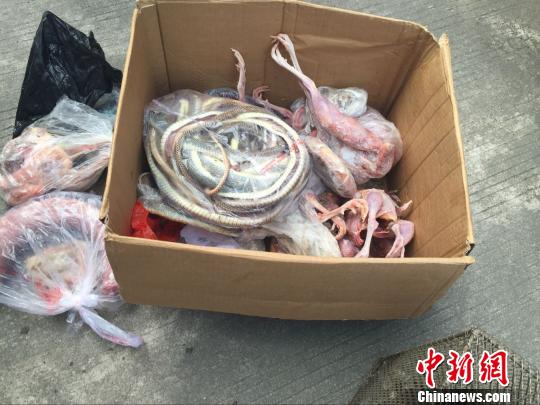
A batch of wild animals and birds – nearly 9 kilograms of snakes, seven tortoises, seven pheasants and two partridges -- are seized during a police raid on a restaurant, April 20, 2016. (Photo/Chinanews.com)
(ECNS) -- A restaurant in Liuzhou, Guangxi Zhuang Autonomous Region exposed by a local newspaper for allegedly serving pangolin was fined 4,000 yuan ($617) on Thursday for illegally serving wildlife dishes.
Guangxi's Nanguo Morning Post reported on April 20 that a restaurant named Shennongge served wildlife dishes at two of its outlets in Liuzhou. Pangolins that were killed and prepared on the spot sold at 1,180 yuan per serving of 500 grams, while frozen pangolin meat sold at 700 to 800 yuan per serving, the paper said.
On April 20, local authorities raided the two outlets, but did not find any pangolin. Instead, they seized a batch of wild animals and birds – nearly 9 kilograms of snakes, seven tortoises, seven pheasants and two partridges. Five kilograms of snakes and the seven tortoises were found alive, and later set free, while the others had been killed and frozen.
Qin Qingjun, deputy head of Liuzhou's public security bureau, said Shennongge had previous records of violating wildlife rules and was subject to a previous seizure in September.
As the restaurant has no terrestrial wildlife business license, police seized all illegal animals and meat, and issued a 4,000 yuan fine.
During an investigation by authorities on April 21, Shennongge denied it had ever served pangolin dishes.
Further investigation on the origin of the animals and the restaurant's supply channels is underway.
A prehistoric-looking mammal with an armored body, pangolins survive on insects. It is now one of the most commonly trafficked species in the illegal wildlife trade.


















































